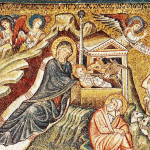We run our website the way we wished the whole internet worked: we provide high quality original content with no ads. We are funded solely by your direct support. Please consider supporting this project.

The Destiny of God’s People
Jesus represents the realization of God’s glorious dream for humanity. In Christ, we see what we who are in Christ are destined to be. As a stick placed in a river is destined to be carried to whatever body of water the river runs to, so all who have allowed themselves to be drawn by the Spirit into Christ are destined to eventually look like Jesus (Rom. 8:28). When he appears at the end of the age, we shall see him as he truly is, John says, for we shall be like him (1 Jn. 3:2).
This is why the New Testament speaks of Christ as “the firstborn among many brothers and sisters”(Rom 8:29). A new family is being brought into being, and we shall all resemble Christ. This is also what Paul means when he refers to Jesus as “the first fruit” of those who now “sleep” (1 Cor. 15:20). The “first fruit” in ancient Israel referred to fruit that was picked before the rest of the crop. These early pickings were, among other things, considered the guarantee that God would be faithful in bringing forth the rest of the crop. Jesus is “the first fruit” of a coming harvest that will look the same as him. Jesus reveals ahead of time the harvest of the humanity that God has always been dreaming of.
Jesus was the Kingdom of God and why all who belong to the Kingdom by definition look like him. The entire creation project is centered on God’s dream of uniting himself with humanity as humanity co-rules with him on the earth. The whole creation is being steered toward a vision of a future in which everything will be harmoniously united under Christ, and thus become a dome in which God is King (Eph 1:9).
While individuals are free to align themselves with this divine vision or not, this glorious vision of humanity and creation becoming a radiant domain of God’s reign, dancing with and in the triune God, has been predestined from before the foundation of the world. It cannot fail to happen. And what we are now discovering is that Jesus incarnates this future in the present. He is the predestined man who embodies the predestined future (1 Pet 1:20).
Jesus manifests the future reign of God in the midst of the present reign of evil powers. He manifests the future union of God with humanity in the midst of a rebellious epoch in which God and humanity continue to be estranged from one another. He manifests humanity restored to their rightful place over the earth in the midst of a humanity that continues to be oppressed. He manifests humanity freed from sin and sickness in the midst of a humanity yet in bondage to sin and yet infected by the devil with sickness.
So too, in the midst of a world that continues to be defined by oppressive powers that incline us toward violence and hatred, Jesus reveals what humanity will look like when we’re exhaustively defined by God’s love. In the midst of a world where death continues to reign, Jesus’ resurrection reveals what humanity will be like when death has finally been overcome. In the midst of a world that continues to be oppressed by the ugly kingdom of Satan, Jesus reveals the beautiful Kingdom of God.
The sheer beauty of this coming kingdom, shining in the midst of the present ugly world, pulls people who are hungry for a different way of doing life into it. We might say it this way: Jesus creates a tribe of the future that God uses to move the oppressed world into its beautiful future.
Photo credit: h.koppdelaney via Visual Hunt / CC BY-ND
Category: General
Tags: Jesus, Kingdom of God, Peace, Racial Reconciliation, Unity, Warfare Worldview
Topics: Following Jesus
Related Reading

Is Suffering Part of God’s Secret Plan?
In the Christian tradition since Augustine, the most common explanation for the apparent arbitrariness of life and God’s interaction with humanity has been God’s mysterious will—his “secret plan,” as Calvin says. Whether or not a child is born healthy or a wife is killed by an intruder is ultimately decided by God. If we ask…

Hearing and Responding to God: Part 1
A reader contacted Greg asking about making “right decisions” assuming an open future and in light of the fact that God seems to rarely speak clearly. In this first response, Greg acknowledges that even with the best of intentions, our decisions can have outcomes that are unexpected even to God! How can we move forward…

How Details in the Gospels Support Their Historicity
*This essay is adapted from G. Boyd & P. Eddy, Lord or Legend? (Baker, 2007). For a fuller discussion, see P. Eddy & G. Boyd, The Jesus Legend (Baker, 2007). There are a number of questions historians ask when they are trying to assess the historical value of an ancient document that claims to report…

Is God Immutable? Part I
For a number of reasons, Plato believed that something changes only to become better or to become worse (Rep. II). Since a perfect being can’t be improved or diminished, he argued, God must be completely unchanging, As this idea was developed over time, Plato’s followers concluded that not only must God’s character be unchanging, but…

The Cross in the Manger
There has been a strand within the Western theological tradition—one that is especially prevalent in contemporary American Evangelicalism—that construes the significance of the cross in strictly soteriological terms. The cross is central, in this view, but only in the sense that the reason Jesus came to earth was to pay the price for our sin…

The Full Meaning of Salvation
Many view salvation as a legal transaction, which means that it’s a mere acquittal from the consequences of sin. While forgiveness of our sin is certainly involved, the NT view of salvation goes far beyond this when it proclaims that Jesus came to save his people from their sins (Mt. 1:23)—not merely the consequences of those sins. In fact,…
